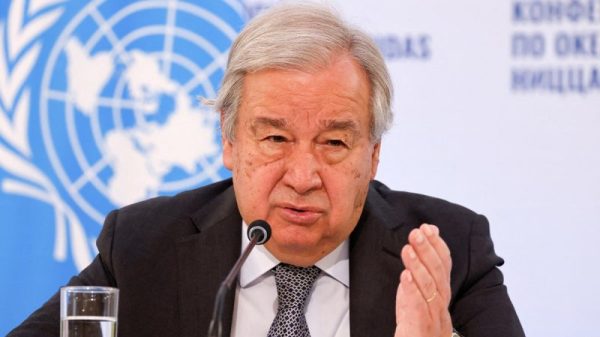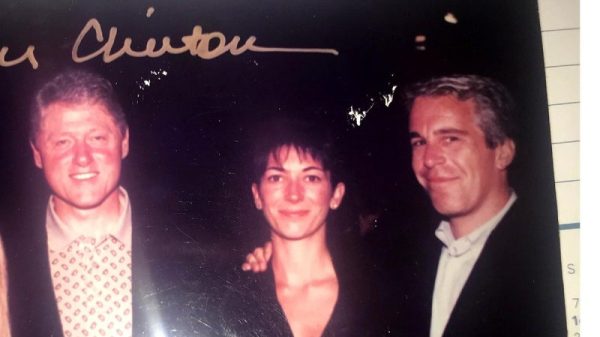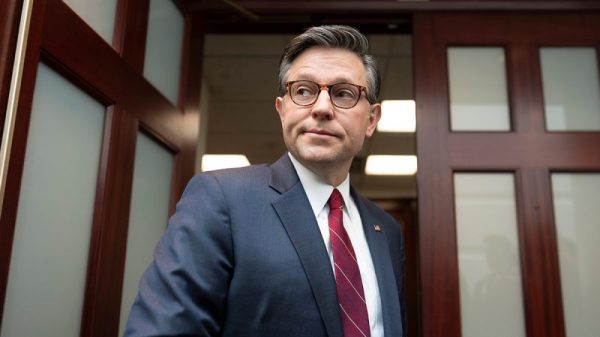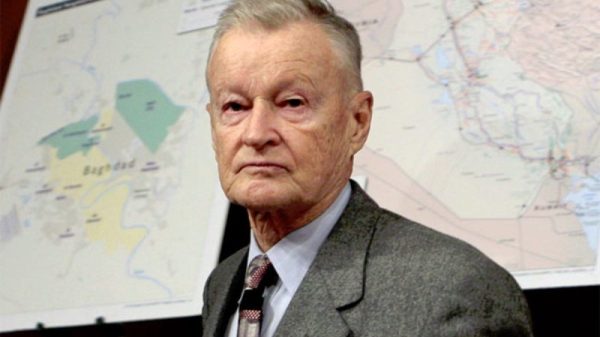The Biden administration is ramping up pressure on Israeli officials to rein in rising settler violence in the occupied West Bank, fearing that a failure to do so will further inflame an already combustible situation and potentially open a second front as Israel wages a military campaign in Gaza to eradicate Hamas.
Most of the world’s attention has focused on Israel’s incursion into Gaza, which has left more than 10,000 Palestinians dead. But the war in Gaza has also stoked increased violence in the occupied West Bank, raising concerns among Biden officials that emboldened hard-right settlers will ignite a multi-front conflict and increase the risk of a Palestinian uprising in the territory.
Thursday marked one of the deadliest days in the West Bank since Hamas’s bloody Oct. 7 attacks on Israel, with 14 Palestinians killed in Jenin and four elsewhere in the West Bank, according to the Palestinian Health Ministry. Nearly 200 Palestinians have been killed in violent clashes in the West Bank over the past month.
President Biden and his top aides have sharpened their criticism of settler violence and raised it repeatedly in calls with top Israeli officials, including Prime Minister Benjamin Netanyahu, according to people familiar with the matter who spoke on the condition of anonymity to disclose private talks. Secretary of State Antony Blinken said last week he had received a “clear commitment” from Israeli officials that they would condemn and address the violence.
U.S. officials are urgently trying to keep the war in Gaza from turning into a broader regional conflagration, seeking to temper anger in the Arab world, repeatedly warning Iran not to encourage its proxies — particularly Lebanon’s Hezbollah — to get involved, and pushing Netanyahu to crack down on the violence in the West Bank, where instability threatens to undermine the fragile restraint that the various parties have exercised so far, experts say.
In addition to fears of escalation, U.S. officials said they want Israel to remain focused on its military operation in Gaza and on keeping its northern border with Lebanon secure, and that doing so requires stability in the West Bank so that Israel is not distracted by a conflict there.
In a call with Israeli President Isaac Herzog this week, Vice President Harris “raised the need to increase stability and security in the West Bank and hold extremist settlers accountable for violent acts,” according to a White House readout of the call. Biden also raised the issue with Netanyahu in a call this week, the White House said.
Some experts said the U.S. warnings had limited prospects of changing the situation on the ground because Netanyahu’s coalition is in part made up of people from the settler movement. Itamar Ben Gvir, who serves as Israel’s minister of national security, is from the settler movement in the West Bank and leads an ultranationalist party that promotes anti-Arab policies. Bezalel Smotrich, who serves as minister of finance, is also a West Bank settler.
U.S. officials said Ben-Gvir and Smotrich’s appointments had emboldened militant settlers well before the current war, which began when Hamas militants entered Israel and killed about 1,400 people in addition to taking more than 200 hostages. Top Biden officials have been highlighting their concerns about West Bank settler violence for several months, efforts that have taken on new urgency since the Oct. 7 attacks, according to two senior administration officials, who spoke on the condition of anonymity to discuss private conversations.
Palestinian communities where
people have been forcibly displaced
by settler violence in 2023:
Before Oct. 7
After Oct. 7
Area A: Under full Palestinian control
Area B: Administered by Palestinian Authority
with Israeli security presence
Area C: Under full Israeli control
Israeli settlements
ISRAEL
Jenin
JOR.
Tulkarm
Nablus
Qalqilya
WEST BANK
Ramallah
Jordan
River
Jericho
Jerusalem
ISRAEL
Bethlehem
Dead
Sea
Hebron
JOR.
10 MILES
Source: West Bank Protection Consortium, B’Tselem
Laris Karklis and Samuel Granados / THE WASHINGTON POST
Palestinian communities where people have been forcibly displaced by settler violence in 2023:
Before Oct. 7
After Oct. 7
Area A:
Under full Palestinian
control
ISRAEL
Jenin
Area B:
Administered by
Palestinian
Authority with Israeli
security presence
Tulkarm
Nablus
Area C:
Under full Israeli
control
Qalqilya
Israeli
settlements
Tel Aviv
WEST BANK
JOR.
Ramallah
Jordan
River
Jericho
Med.
Sea
ISRAEL
Jerusalem
Bethlehem
Dead
Sea
GAZA
Hebron
Palestinian
territory
10 MILES
Source: West Bank Protection Consortium, B’Tselem
Laris Karklis and Samuel Granados / THE WASHINGTON POST
The two officials said the Palestinian Authority, which governs parts of the West Bank, also has a role to play in stabilizing the West Bank. But the Palestinian Authority has long been criticized as ineffective, and officials say Israeli-imposed restrictions, including additional checkpoints throughout the territory, slow the movement of Palestinian security forces trying to curb the violence.
Jewish settlers in recent weeks have attacked and killed Palestinians without provocation, experts said, in an effort to drive them out of their communities through such tactics as burning property, tearing up land and destroying olive trees, which are a primary source of income for many Palestinians.
“The American response has been Israel should hold settlers accountable, which is like saying nothing at all because Israel is structurally incapable of holding settlers accountable because this is a government of, by and for settlers,” said Mairav Zonszein, a senior analyst on Israel-Palestine with Crisis Group, an independent nonprofit that says it is focused on preventing and resolving deadly conflict.
“[Biden] does talk about a two-state solution. He does talk about settlements not being able to expand. But those have become empty statements because in practice, Israel gets all the support it wants from the United States,” Zonszein said. “He’s right to highlight this, but Israel knows it can act with impunity because it’s done so over and over again.”
Israeli officials recently placed an order for 24,000 assault rifles from the United States, a request that raised concerns in the State Department and on Capitol Hill because of the possibility that the guns could be given to West Bank settlers. Israeli officials told the Biden administration the guns would go only to government forces.
U.S. officials say they cannot force Israel to take specific actions but that Israeli officials have taken modest steps in response to their private admonitions. Netanyahu this week issued a rare condemnation of settler violence and said he had told Biden that it “is a small extreme minority that does not come from the settlement movement. We condemn them and will deal with them with all the severity of the law.”
Israeli officials have also made a small number of arrests of settlers. But Israeli forces have detained more than 1,700 Palestinians in the West Bank since the Oct. 7 attacks.
Some experts said the Biden administration has not taken specific policy steps that would more seriously signal to Israel that it needs to address settler violence.
The administration, for instance, has not reversed a Trump-era policy declaring that Israeli settlements on occupied Palestinian land are not necessarily illegal. The administration also has not reversed a policy requiring goods made in the West Bank to be labeled “Made in Israel.” Previous policy had required that such products be labeled as made in the West Bank.
The United States, including during Biden’s presidency, has also vetoed or otherwise derailed U.N. resolutions that condemned or aimed to halt Israeli settlements in the West Bank. At the end of his presidency, President Barack Obama had the United States abstain from a U.N. Security Council declaring Israeli settlements in the West Bank, Gaza Strip and East Jerusalem illegal, a major departure from the longtime U.S. precedent of vetoing such resolutions.
“The U.S. could take a much harder line on settlements in general, not to mention settler violence. This administration has done almost nothing to reverse the Trump legacy, which did enormous damage” by emboldening the settler movement, said Khaled Elgindy, senior fellow at the Middle East Institute and director of the Program on Palestine and Palestinian-Israeli Affairs.
American officials have also raised concerns about restrictions on Palestinian movement in the West Bank since the Oct. 7 attacks, which they have warned Israeli officials could ignite even more anger and raise the risk of lone wolf attacks or other forms of violence.
Late last month, Biden addressed West Bank settler violence in some his most forceful language directed at Israelis.
“I continue to be alarmed about extremist settlers attacking Palestinians in the West Bank that are pouring gasoline on the fire,” Biden said, noting at the time that the attacks were happening in areas recognized by Israel as Palestinian-controlled. “This was a deal. The deal was made, and they’re attacking Palestinians in places they’re entitled to be. It has to stop. They have to be held accountable, and it has to stop now.”
A group of Democratic senators this week, led by Sen. Jon Ossoff (D-Ga.), called on the Biden administration to do more to enhance security in the West Bank by halting settler violence and the displacement of Palestinians.
“We are encouraged by recent statements from the White House emphasizing the need to mitigate settler violence,” the group of seven senators wrote to Biden.
“However, more must be done,” the senators wrote. “We urge your administration to enhance its diplomatic efforts to prevent further violence and respectfully request a briefing from your administration on current policy to address incidents of extremist settler violence and the forcible displacement of Palestinians in the West Bank.”
On Thursday, Ossoff and Sen. Lindsey O. Graham (R-S.C.) introduced a bill that would provide $10 million in emergency funding in part to help address West Bank instability.
“When you think about it, for both the U.S. and Israel, it’s in their security interests to rein this in, because the West Bank is already extremely combustible,” Zonszein said. “Israel has much more of a hold in the West Bank than Gaza, but it’s very, very scary for the ability of that front to erupt even more.”
The Biden administration is ramping up pressure on Israeli officials to rein in rising settler violence in the occupied West Bank, fearing that a failure to do so will further inflame an already combustible situation and potentially open a second front as Israel wages a military campaign in Gaza to eradicate Hamas.
Most of the world’s attention has focused on Israel’s incursion into Gaza, which has left more than 10,000 Palestinians dead. But the war in Gaza has also stoked increased violence in the occupied West Bank, raising concerns among Biden officials that emboldened hard-right settlers will ignite a multi-front conflict and increase the risk of a Palestinian uprising in the territory.
Thursday marked one of the deadliest days in the West Bank since Hamas’s bloody Oct. 7 attacks on Israel, with 14 Palestinians killed in Jenin and four elsewhere in the West Bank, according to the Palestinian Health Ministry. Nearly 200 Palestinians have been killed in violent clashes in the West Bank over the past month.
President Biden and his top aides have sharpened their criticism of settler violence and raised it repeatedly in calls with top Israeli officials, including Prime Minister Benjamin Netanyahu, according to people familiar with the matter who spoke on the condition of anonymity to disclose private talks. Secretary of State Antony Blinken said last week he had received a “clear commitment” from Israeli officials that they would condemn and address the violence.
U.S. officials are urgently trying to keep the war in Gaza from turning into a broader regional conflagration, seeking to temper anger in the Arab world, repeatedly warning Iran not to encourage its proxies — particularly Lebanon’s Hezbollah — to get involved, and pushing Netanyahu to crack down on the violence in the West Bank, where instability threatens to undermine the fragile restraint that the various parties have exercised so far, experts say.
In addition to fears of escalation, U.S. officials said they want Israel to remain focused on its military operation in Gaza and on keeping its northern border with Lebanon secure, and that doing so requires stability in the West Bank so that Israel is not distracted by a conflict there.
In a call with Israeli President Isaac Herzog this week, Vice President Harris “raised the need to increase stability and security in the West Bank and hold extremist settlers accountable for violent acts,” according to a White House readout of the call. Biden also raised the issue with Netanyahu in a call this week, the White House said.
Some experts said the U.S. warnings had limited prospects of changing the situation on the ground because Netanyahu’s coalition is in part made up of people from the settler movement. Itamar Ben Gvir, who serves as Israel’s minister of national security, is from the settler movement in the West Bank and leads an ultranationalist party that promotes anti-Arab policies. Bezalel Smotrich, who serves as minister of finance, is also a West Bank settler.
U.S. officials said Ben-Gvir and Smotrich’s appointments had emboldened militant settlers well before the current war, which began when Hamas militants entered Israel and killed about 1,400 people in addition to taking more than 200 hostages. Top Biden officials have been highlighting their concerns about West Bank settler violence for several months, efforts that have taken on new urgency since the Oct. 7 attacks, according to two senior administration officials, who spoke on the condition of anonymity to discuss private conversations.
Palestinian communities where
people have been forcibly displaced
by settler violence in 2023:
Before Oct. 7
After Oct. 7
Area A: Under full Palestinian control
Area B: Administered by Palestinian Authority
with Israeli security presence
Area C: Under full Israeli control
Israeli settlements
ISRAEL
Jenin
JOR.
Tulkarm
Nablus
Qalqilya
WEST BANK
Ramallah
Jordan
River
Jericho
Jerusalem
ISRAEL
Bethlehem
Dead
Sea
Hebron
JOR.
10 MILES
Source: West Bank Protection Consortium, B’Tselem
Laris Karklis and Samuel Granados / THE WASHINGTON POST
Palestinian communities where people have been forcibly displaced by settler violence in 2023:
Before Oct. 7
After Oct. 7
Area A:
Under full Palestinian
control
ISRAEL
Jenin
Area B:
Administered by
Palestinian
Authority with Israeli
security presence
Tulkarm
Nablus
Area C:
Under full Israeli
control
Qalqilya
Israeli
settlements
Tel Aviv
WEST BANK
JOR.
Ramallah
Jordan
River
Jericho
Med.
Sea
ISRAEL
Jerusalem
Bethlehem
Dead
Sea
GAZA
Hebron
Palestinian
territory
10 MILES
Source: West Bank Protection Consortium, B’Tselem
Laris Karklis and Samuel Granados / THE WASHINGTON POST
The two officials said the Palestinian Authority, which governs parts of the West Bank, also has a role to play in stabilizing the West Bank. But the Palestinian Authority has long been criticized as ineffective, and officials say Israeli-imposed restrictions, including additional checkpoints throughout the territory, slow the movement of Palestinian security forces trying to curb the violence.
Jewish settlers in recent weeks have attacked and killed Palestinians without provocation, experts said, in an effort to drive them out of their communities through such tactics as burning property, tearing up land and destroying olive trees, which are a primary source of income for many Palestinians.
“The American response has been Israel should hold settlers accountable, which is like saying nothing at all because Israel is structurally incapable of holding settlers accountable because this is a government of, by and for settlers,” said Mairav Zonszein, a senior analyst on Israel-Palestine with Crisis Group, an independent nonprofit that says it is focused on preventing and resolving deadly conflict.
“[Biden] does talk about a two-state solution. He does talk about settlements not being able to expand. But those have become empty statements because in practice, Israel gets all the support it wants from the United States,” Zonszein said. “He’s right to highlight this, but Israel knows it can act with impunity because it’s done so over and over again.”
Israeli officials recently placed an order for 24,000 assault rifles from the United States, a request that raised concerns in the State Department and on Capitol Hill because of the possibility that the guns could be given to West Bank settlers. Israeli officials told the Biden administration the guns would go only to government forces.
U.S. officials say they cannot force Israel to take specific actions but that Israeli officials have taken modest steps in response to their private admonitions. Netanyahu this week issued a rare condemnation of settler violence and said he had told Biden that it “is a small extreme minority that does not come from the settlement movement. We condemn them and will deal with them with all the severity of the law.”
Israeli officials have also made a small number of arrests of settlers. But Israeli forces have detained more than 1,700 Palestinians in the West Bank since the Oct. 7 attacks.
Some experts said the Biden administration has not taken specific policy steps that would more seriously signal to Israel that it needs to address settler violence.
The administration, for instance, has not reversed a Trump-era policy declaring that Israeli settlements on occupied Palestinian land are not necessarily illegal. The administration also has not reversed a policy requiring goods made in the West Bank to be labeled “Made in Israel.” Previous policy had required that such products be labeled as made in the West Bank.
The United States, including during Biden’s presidency, has also vetoed or otherwise derailed U.N. resolutions that condemned or aimed to halt Israeli settlements in the West Bank. At the end of his presidency, President Barack Obama had the United States abstain from a U.N. Security Council declaring Israeli settlements in the West Bank, Gaza Strip and East Jerusalem illegal, a major departure from the longtime U.S. precedent of vetoing such resolutions.
“The U.S. could take a much harder line on settlements in general, not to mention settler violence. This administration has done almost nothing to reverse the Trump legacy, which did enormous damage” by emboldening the settler movement, said Khaled Elgindy, senior fellow at the Middle East Institute and director of the Program on Palestine and Palestinian-Israeli Affairs.
American officials have also raised concerns about restrictions on Palestinian movement in the West Bank since the Oct. 7 attacks, which they have warned Israeli officials could ignite even more anger and raise the risk of lone wolf attacks or other forms of violence.
Late last month, Biden addressed West Bank settler violence in some his most forceful language directed at Israelis.
“I continue to be alarmed about extremist settlers attacking Palestinians in the West Bank that are pouring gasoline on the fire,” Biden said, noting at the time that the attacks were happening in areas recognized by Israel as Palestinian-controlled. “This was a deal. The deal was made, and they’re attacking Palestinians in places they’re entitled to be. It has to stop. They have to be held accountable, and it has to stop now.”
A group of Democratic senators this week, led by Sen. Jon Ossoff (D-Ga.), called on the Biden administration to do more to enhance security in the West Bank by halting settler violence and the displacement of Palestinians.
“We are encouraged by recent statements from the White House emphasizing the need to mitigate settler violence,” the group of seven senators wrote to Biden.
“However, more must be done,” the senators wrote. “We urge your administration to enhance its diplomatic efforts to prevent further violence and respectfully request a briefing from your administration on current policy to address incidents of extremist settler violence and the forcible displacement of Palestinians in the West Bank.”
On Thursday, Ossoff and Sen. Lindsey O. Graham (R-S.C.) introduced a bill that would provide $10 million in emergency funding in part to help address West Bank instability.
“When you think about it, for both the U.S. and Israel, it’s in their security interests to rein this in, because the West Bank is already extremely combustible,” Zonszein said. “Israel has much more of a hold in the West Bank than Gaza, but it’s very, very scary for the ability of that front to erupt even more.”





















